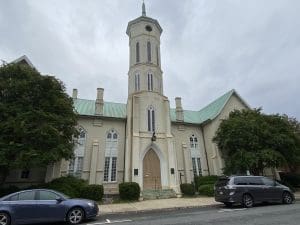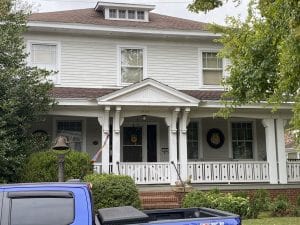On Thursday, March 7, 1912, a large group of Fredericksburg citizens met at the Fredericksburg courthouse to hear Miss Mary Johnston, a well-known Virginia novelist and a strong proponent of the suffrage movement, and Mrs. B. B. Valentine, head of Virginia’s Equal Suffrage League, speak on the topic of women’s suffrage. The Equal Suffrage League (ESL) had been formed in Richmond a few years before and was now spreading throughout the Commonwealth. Leaders in the League traveled from place to place to encourage women from Virginia to form local chapters in their cities.
The Fredericksburg Chapter Is Formed
Their speeches were well-received. The following morning, twenty-two local citizens, including several men, formed the Fredericksburg chapter of the ESL. Janetta R Fitzhugh was elected the first president of the chapter and remained president of the local ESL until 1920 when the League of Women Voters was established.
An active member of various community organizations, Janetta was a fitting choice to lead the suffrage movement in Fredericksburg. She and Mary Johnston had known each other for several years, visiting with one another regularly, and Mary Johnston had already spoken to the Literary Society of Fredericksburg about equal suffrage in January 1911, probably at Janetta’s request. Janetta had contributed books and time to the cause in Richmond, had attended many of their meetings, and had been chosen as a delegate to represent Virginia in the 1911 National American Woman Suffrage Association (NAWSA) convention.
The Woman Suffrage Procession and Janetta's Active Service to the Cause
Over the next several years, Janetta became increasingly involved in the suffrage movement. She attended the NAWSA conventions as a Virginia delegate in 1912, 1914, and 1917, and, on March 3, 1913, she represented Virginia in the great Woman Suffrage Procession in Washington, DC, marching in the front row with the Virginia sign. In 1915, Janetta was one of a handful of women who spoke directly to Virginia governor Henry Carter Stuart to ask for his support for the women’s suffrage bill in the state legislature when a group of 200 women delegates marched to his office.
While many of the records for the Fredericksburg chapter were destroyed, we know that Janetta worked hard to increase support for the ESL in our area. The group organized educational suffrage events at schools, churches, and county fairs and circulated petitions for people to sign in support of equal voting rights for women.
Due to ill health and the demands of World War I, Janetta was not able to be as active in 1918. However, by this time, members included several hundred women and nearly a dozen men, including Janetta’s brother-in-law, Richard Henry Lee Chichester, then a circuit court judge and later a judge of the Virginia Supreme Court of Appeals. When the ESL of Fredericksburg was reorganized in 1919, Janetta R. FitzHugh was once again chosen as president.
Women Are Given the Right to Vote!
Although the Equal Suffrage League was ultimately unsuccessful in persuading the Virginia State Legislature to approve the 19th amendment of the U.S. Constitution, the required majority of states did pass the amendment. In August 1920, women were officially granted the right to vote in the United States.
While Virginia legislators had not supported the amendment, they passed a bill allowing women to pay the required poll tax after the deadline. This permitted women to register to vote in time for the 1920 elections. Janetta was among the first women in Fredericksburg to pay the poll tax and register to vote in the city of Fredericksburg in October 1920 along with hundreds of other women in the city who then voted in the November 1920 elections for the first time.
After voting in her first election, Janetta FitaHugh lived another three decades with her sister and brother-in-law on Washington Avenue. You can visit her grave in the Confederate Cemetery in downtown Fredericksburg, where she was laid to rest with her parents and other family members.
Women all over the United States fought for the right to vote in the early 20th century. While we don’t know most of their names or what they did in the fight for equal suffrage, we do know one of the main proponents of the cause here in Fredericksburg. Thanks to Janetta R. FitzHugh and many of her co-workers in our city, there were multiple improvements made to our lives and circumstances, including the right for women to vote.
For Further Reading
Lila Hardaway Meade Valentine, Suffragist and Social Reformer
Mary Johnston, Novelist and Suffragist
Official Program of the Woman Suffrage Procession, March 3, 1913




